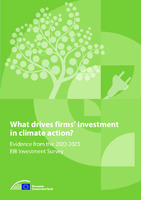What drives firms’ investment in climate action? Evidence from the 2022-2023 EIB Investment Survey

com doc
Συγγραφέας
European Investment Bank
Ημερομηνία
2023-06-15Θεματικές επικεφαλίδες
Climate action and environment ; Economics ; European Union ; EIBISΠερίληψη
The European economy is experiencing significant turbulence as recurring crises reverberate across all
EU countries, their economies and business operations. Since 2020, shocks ranging from the COVID-19
pandemic to the Russian invasion of Ukraine have disrupted supply chains and destabilised European
energy markets. Price volatility and uncertainty have reached multi-decade highs and risk derailing the
post-pandemic recovery. At the same time, climate change is still the most pervasive global challenge.
Extreme weather events are on the rise. Any delay in tackling the climate issue may trigger sudden and
irreversible damage to the planet. Faced with this difficult business environment, firms are constantly
called upon to confront new challenges and come up with innovative solutions.
The disruption of energy supplies caused by the war in Ukraine has proven particularly challenging for
EU firms. Extremely high energy prices significantly alter firms’ costs, particularly for energy-intensive
industries such as food, paper, chemicals and metals. Less energy-intensive industries also face hardship,
as the increase in prices is not only limited to energy but has rapidly extended to other markets, creating
inflationary pressures.
Together with these short-term challenges, climate change represents the most significant long-term
threat for EU companies. A recently published report by the Intergovernmental Panel on Climate Change
(IPCC) points to the “unprecedented scale of recent change across the climate system,” the increasing
frequency of extreme climate events, and the necessity of taking immediate action (IPCC, 2021). In Europe
alone, extreme weather events caused over €145 billion in economic losses from 2012 to 2022. Over the
same period, climate-related economic losses increased by around 2% annually (European Environment
Agency, 2022). At the same time, the likelihood of a disorderly transition to green energy is increasing,
particularly since the Ukraine war.
The two crises – energy and climate – are closely interrelated and highlight the importance of a swift
transition to a sustainable European economy. Although energy price spikes may call for short-term
support measures, climate change requires the European Union to embrace the green transition in the
longer term.
The involvement of the European Union and its members in the green transition will be crucial, as they
are able to design new policy tools and channel funds appropriately. At the same time, firms are called
on to play a pivotal role. By investing in climate adaptation and mitigation measures, especially energy
efficiency, firms can protect themselves from the increased frequency of extreme climate events, reduce
energy costs and take further action to achieve net-zero emissions. Thus, it is important to take a closer
look at how firms are responding to this highly uncertain and rapidly changing business environment.
This report draws from data collected for the EIB Investment Survey 2022-2023. It examines the willingness
of European firms to address climate change in the current context of the energy crisis. First, it presents
the answers provided by firms across the European Union to a set of questions on energy and climate
change. Then, it goes more in-depth by providing firms’ answers in each EU country.
Γλώσσα
ΑγγλικάΣημείωση
This is a report of the EIB Economics Department. The data source for this report is the EIB Investment Survey (EIBIS) 2022-2023. Results are weighted by industry group (sector), firm size-class and country. The methodology of the EIBIS survey is available at: https://www.eib.org/en/about/economic-research/surveys-data/about-eibis. Contact: eibis@eib.org.doi: 10.2867/395409
